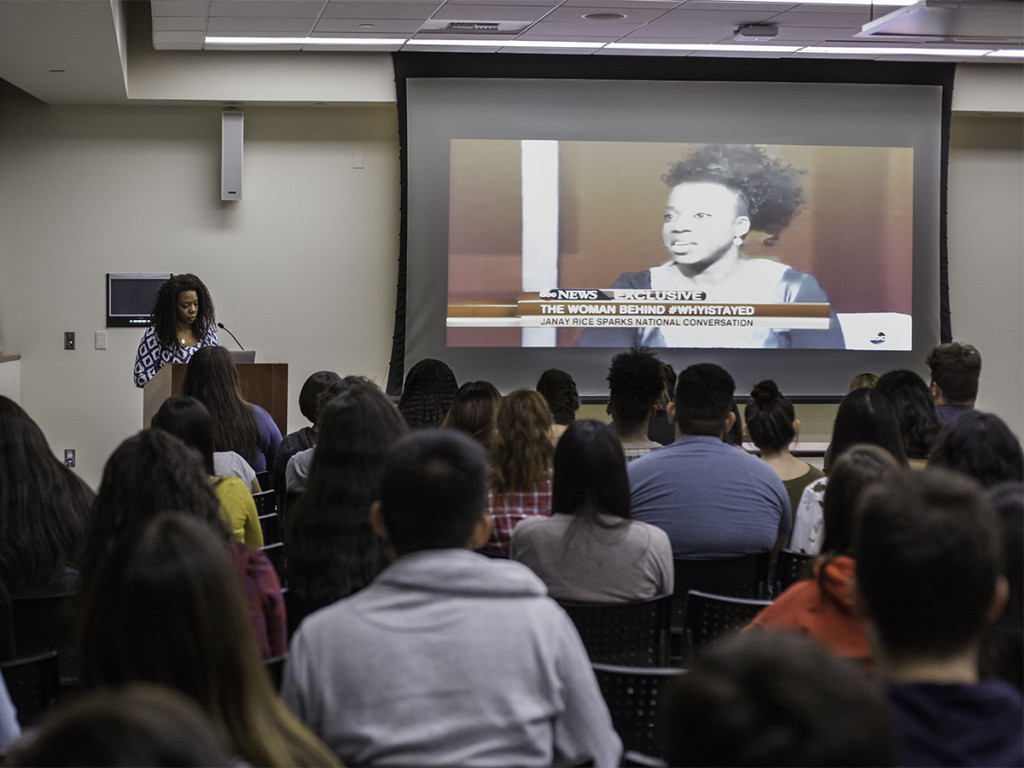
On the evening of Wednesday, Oct. 26, members of UCR’s Women’s Resource Center teamed up with anti-domestic violence activist Beverly Gooden to bring UCR the #WhyIStayed event. Taking place in HUB 355, the event shed light on the injustices of domestic violence that plague many college campuses and extend into other domains of life for many victims.
Gooden, keynote speaker, kicked off the event by playing a video from the National Domestic Violence Hotline. It featured a short, but poignant video of a woman staring into the camera with a series of bruises covering her body. This video set the tone for the event, foreshadowing the tough-to-swallow subject matter that would follow. Gooden, a victim of domestic violence herself, took the first few minutes to briefly explain her bout with the injustice that was perpetrated from her then fiance.
She said the catalyst that made her realize the cycle of abuse was one night when her fiance tried to attack her while she was sleeping. Gooden awoke to a series of pushes that culminated in a vicious choking that almost claimed her life.
“I wanted to live more than I wanted to be married to him,” Gooden said.
It was after this that Gooden finally went and got the help that she desperately needed. After experiencing the abuse, she one day took to Twitter, which she emphasized was a necessary hub to voice her grievances, and started the hashtag, “WhyIStayed.” Her tweets began to get an enormous amount of attention, and later that evening #WhyIStayed was the number one trending topic with over 100,000 accumulated tweets. One of the tweets that stood out to her was from a young woman who had suffered similar abuse.
“My word was the only evidence,” read the tweet. This struck a personal chord in Gooden, considering that she had went through this ordeal and empathized with the challenges that come from attempting to leave abuse. Once her tweets went viral, she began to book appearances on popular news outlets such as NBC’s “Good Morning America” where she talked with Dr. Phil and Robin Roberts. She had begun her singular plight to shed light on the difficulties of domestic violence and the repercussions it has on the victim’s life.
After explaining the origins of the hashtag, Gooden went on to explain a few fundamental reasons why people stay in abusive relationships. One of the points was dependence. Dependence, according to Gooden, makes you feel as though you can’t live without your abuser even though they’re inflicting continuous harm on you. But when your lives become incredibly intertwined, and when monetary value becomes a shared asset, it becomes exceedingly difficult to simply jump ship.
Fear and threats were other key deterrents to leaving. Usually the aggressor of the abuse throws out looming threats that typically involve the victim’s extended family. This plays psychological warfare on the person enduring it all because they need to make a conscious decision to value their family members or their own safety.
Others also opt to use fear rhetoric like feigning suicide in order to keep a hold on their significant other. And, per Gooden, one of the most pressing reasons why people stay is perhaps the simplest: Love. Love is a powerful emotion and oftentimes it can make us liable to manipulation.
“I wanted R&B songs to be my story,” said Gooden.
Gooden also took the time to explain the paramount importance for others to notice key signs of abuse early on. When someone is in a cycle of domestic violence, they may not be keen on what to expect, which leaves responsibility to people in association with the victim to learn cues. Isolation from friends is the most prominent sign. When people begin to deviate from the norm of hanging out with friends while they’re in a relationship, it may be a cause for concern. Additionally, when a victim begins justifying wrongful or rude behavior by their significant other, it speaks volumes as to how they actually feel. Silence and excuses can indicate that they’re scared to speak out.
[pullquote]Love is a powerful emotion and oftentimes it can make us liable to manipulation. [/pullquote]
Toward the end of the event, the topics went even further in depth. Gooden prioritized the discussion of certain groups of people who may endure domestic violence in disproportionate amounts. She noted that black women and LGBT communities experience abuse at an alarmingly high rate.
Victim blaming was one of the last topics she covered. Gooden suggested victim blaming occurs at an alarming rate when people speak out about their abuse. One of the definitions of victim blaming is a “tactic used by the abuser to escape responsibility.” This evasion of responsibility trickles onto others who are on the outside looking in. Soon, it becomes almost like a hateful culture of individuals who are adamant about victims not doing everything in their power to leave or protect themselves. Many of them aren’t aware of the variables that are a natural result of abuse.
“Observe. Feel. Speak out.” These were the last of Gooden’s words as she closed her presentation on domestic violence. Those four words symbolize the work that everyone needs to do in order to fight the epidemic of violence. Just because you aren’t a victim doesn’t mean you can’t lend a helping hand to solving the issue.
Editor’s Note: A previous version of this article failed to acknowledge the UCR Women’s Resource Center’s role in bringing forth the #WhyIStayed event. The proper correction has been made and the Highlander regrets the error.








